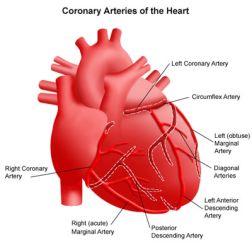Angioplasty treatments for Coronary Artery Disease is a procedure for returning blood flow within the artery.
What is Angioplasty?
Angioplasty and stent placement is a non-surgical procedure performed to relieve narrowing or obstruction of the arteries to the muscles of the heart. Coronary Artery is a disease in which a waxy substance called plaque builds up inside the coronary arteries. Here, we are going to tell a bit about angioplasty treatments for coronary artery disease for your information.
So, if you have coronary artery disease, the arteries in your heart are narrowed or blocked by plaque. From a junior age, plaque can start to go into your blood vessel walls. As you get older in age, the plaque swells up. That irritates the walls and raises the risk of blood clots and heart attacks.

Why is an angioplasty needed?
Angioplasty is a treatment used to treat a type of heart disease known as atherosclerosis. Atherosclerosis is the formation of slow fat plaque in your heart blood vessels. Your doctor may suggest angioplasty as a treatment option when medication or lifestyle changes are insufficient to improve your cardiovascular health, or if you have a heart attack, severe chest pain (angina) or other symptoms.
If the main artery that carries blood to the left side of your heart is narrow, if the heart muscle is weak or if you have some painful blood vessels, the coronary artery bypass surgery may be a better choice than angioplasty. In the coronary artery bypass surgery, the blocked part of your artery is passed through the blood vessels from other parts of your body.
If you have diabetes and some problems like multiple blockages, your doctor might suggest coronary artery surgery. Angioplasty versus bypass surgery will depend on the extent of heart disease and overall medical condition.
How is Angioplasty done?
Angioplasty opens the blocked artery and restores normal blood flow to your heart muscle. It’s not a big surgery. It is performed by threading a catheter or a thin tube through a small puncture in the arteries of the foot or arms to the heart.
Angioplasty involves temporarily inserting and inflating a small balloon where your arteries are blocked to help widen the arteries. Angioplasty can improve symptoms of blocked arteries, such as chest pain and shortness of breath. It can also be used during heart attack quickly opening the blocked arteries and reducing the amount of damage to your heart.
An angioplasty and stent insertion procedure didn’t take a lot of time. The procedure varies, but in most of the cases, it takes between 30 to 60 minutes to complete.
Who performs angioplasty?
The following specialists perform angioplasty:
- Cardiac surgeons specialize in the surgical treatment of conditions of the heart and its blood vessels. Cardiac surgeons may also be known as cardiothoracic surgeons.
- Cardiologists and interventional cardiologists specialize in diagnosing and treating the heart and its blood vessels using catheter procedures and imaging techniques.
- Nephrologists specialize in diagnosing and treating kidney diseases.
- Vascular and interventional radiologists specialize in the treatment of blood vessel diseases and other conditions using catheter procedures and imaging techniques.
- Vascular surgeons specialize in the surgical treatment of diseases and conditions of the lymphatic system and blood vessels outside the heart and brain.
Will I feel pain?
Your comfort and relaxation are important to you and your care team. You may feel a pinch or pinprick pain during the IV placement and brief stinging during numbing of the catheter insertion area with a local anaesthetic. You may also feel pressure as your doctor makes the incision and inserts the catheter. It is common to feel some discomfort when the balloon is inflated to open your artery.
You will receive enough sedative medications to keep you relaxed and comfortable. Tell your doctor or care team if you are uncomfortable.
How do I prepare for my angioplasty?
You are an important member of your own healthcare team. The steps you take before your angiography can improve your comfort and outcome.
You can prepare for angioplasty by:
- Answering all questions about your medical history and medications. This includes prescriptions, over-the-counter drugs, herbal treatments, and vitamins. It is a good idea to carry a current list of your medical conditions, medications, and allergies at all times.
- Following all instructions about eating and drinking before angioplasty.
- Taking or stopping medications exactly as directed. Your doctor will give you specific instructions about taking your medications. This may include not taking aspirin, ibuprofen (Advil, Motrin), and blood thinners. With certain contrast dyes, you should not take metformin (Glucophage), an oral medication for diabetes, for 48 hours before and after your angioplasty.
Can Angioplasty cure coronary artery disease?
It will open a blocked artery, but it won’t cure the coronary artery disease. Lifestyle details like smoking and diet will still need some tweaking. You’ll be given an exercise program to follow. You may need to take one or more medicines, too.
How much does it cost to do an Angioplasty
Angioplasty procedure must be carried out by a team of cardiologists, assistants and nurses in catheterisation operation theatre. This procedure is often performed during a heart attack as a life-saving measure to release arteries quickly; many heart disease patients also decide to have angioplasty as a precautionary measure before a heart attack occurs. It is advised that angioplasty is used together with lifestyle changes to fight heart disease.
Putting a simple figure on coronary angioplasty is difficult. The costs as shown online are intended as base prices. One of the ways to know the overall cost of this treatment is best to check with the hospital.
Who can help you with this cost
Financial Security – It is There When Needed
Levine can help you to protect yourself and the future of your loved ones. Get immediate financial security. Don’t touch your savings. Let insurance provide it.
She can help provide financial security in times of hardship and will be able to ease the financial burden of your dependents in your absence.
Contact our AIA INSURANCE AGENT LEVINE LEE to get in touch with us and start your personal coverage, group coverage or choose your plan now. Get covered correctly. Be advised correctly. Call Levine Lee (+6012-684 0948) today to be advised on the best insurance protection personalized for you. Or send us the form below on your interest.

At Red Cover Life Planning, we emphasize our people- helping them grow, expanding their abilities, and discovering new opportunities. Join us now to be part of our team and story.








